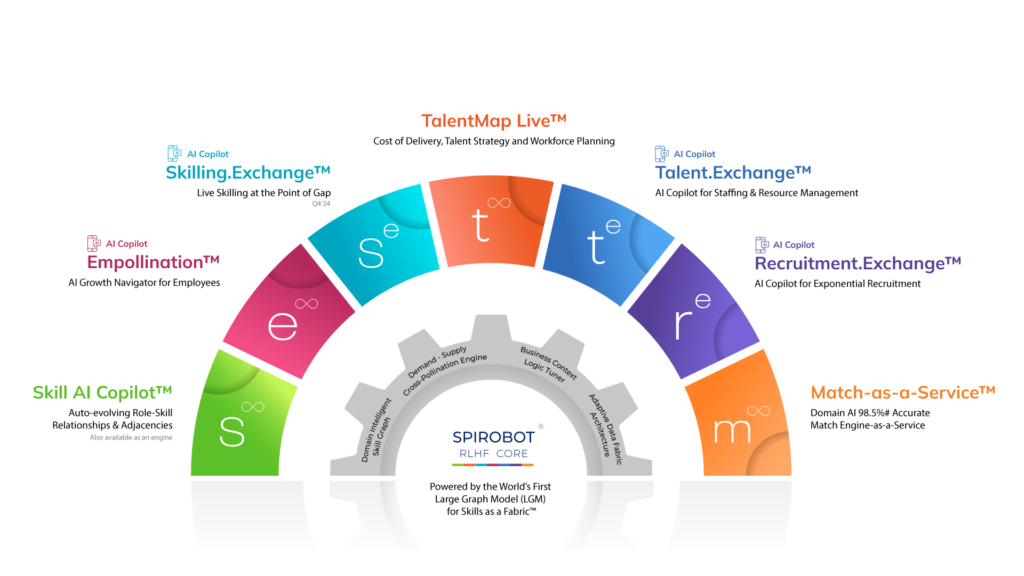How Does Data-Driven Talent Management Benefit Organizations?
Data-driven talent management involves collecting, analyzing, and interpreting employee data to gain valuable insights into their skills, performance, engagement, and career aspirations.
With these insights, organizations can:
- Make better hiring decisions: By analyzing skills gaps and identifying top performers’ profiles, you can create targeted recruitment campaigns and select candidates with the right skill sets.
- Drive employee development: Data helps personalize learning and development opportunities, focusing on in-demand skills and closing skill gaps.
- Improve employee engagement: By understanding employee sentiment and preferences, you can create a more positive work environment, increasing retention.
- Optimize workforce planning: Data-driven talent management allows for proactive talent forecasting and planning, ensuring you have the right skills to meet future business needs.
Benefits of Data-Driven Talent Management
– Make better hiring decisions
– Drive employee development
– Improve employee engagement
– Optimize workforce planning
However, creating a data-driven talent management culture goes beyond simply collecting data. It requires a shift in mindset across all levels of the organization.
Tips to Cultivate an Organizational Approach for Data-Driven Talent Management:
1. Fostering Data Literacy
For data-driven talent management to truly flourish, employees at all levels need to understand the purpose and value of data. This includes basic data analysis skills, interpreting data visualizations, and a comfort level with data-driven decision-making. Data literacy is more than just understanding numbers; it’s about using data to inform strategic thinking and problem-solving.
Tips to Cultivate Data-Driven Talent Management:
1. Fostering Data Literacy
2. Embracing Change Management
3. Securing Executive Sponsorship
Building a strong data-driven culture requires a multifaceted approach:
- Invest in comprehensive training: Equip employees with the skills to understand, interpret, and utilize data effectively. Tailor training programs to different roles and levels within the organization. For instance, HR professionals might benefit from training in workforce analytics, while managers could focus on performance metrics and data-driven decision-making.
- Develop a robust data champions program: Identify passionate individuals who can become advocates for data-driven initiatives. These champions can help spread data literacy, bridge communication gaps between data analysts and business users, and drive data-driven projects.
- Make data accessible and user-friendly: Ensure data is readily available and presented in a clear, understandable format. Utilize interactive dashboards and visualizations to make data engaging and actionable. Empower employees to explore data independently and discover insights.
- Foster a culture of experimentation and learning: Encourage employees to ask questions, challenge assumptions, and use data to test new ideas. Create a safe environment where failure is seen as a learning opportunity.
- Integrate data literacy into performance management: Incorporate data-driven goals and metrics into performance evaluations. Reward employees for using data to improve processes and outcomes.
2. Embracing Change Management
Transitioning to a data-driven talent management culture requires careful planning and execution. It’s essential to address potential challenges and resistance to change head-on.
- Communicate the vision clearly: Articulate the organization’s goals for data-driven talent management and how they align with the overall business strategy. Use clear and compelling language to explain the benefits of this approach.
- Involve employees in the process: Seek input from employees on challenges, concerns, and suggestions. This fosters a sense of ownership and buy-in.
- Provide ongoing support and resources: Offer mentorship, coaching, and training to help employees develop the skills and confidence to work with data.
- Celebrate successes: Recognize and reward individuals and teams with exceptional data-driven achievements. This reinforces the value of data-driven practices.
- Measure and iterate: Track the progress of the change management initiative and adjust your approach as needed. Gather feedback from employees to identify areas for improvement.
3. Securing Executive Sponsorship
Strong leadership support is crucial for the successful implementation of data-driven talent management. Executive sponsors can champion the initiative, allocate resources, and ensure alignment with overall business objectives.
- Build a compelling business case: Clearly demonstrate data-driven talent management’s potential return on investment (ROI). Highlight how data can drive cost savings, improve efficiency, and enhance talent acquisition and retention.
- Align data initiatives with business goals: Ensure data-driven projects directly support the organization’s strategic priorities. This helps secure executive buy-in and demonstrates the value of data.
- Establish clear accountability: Assign ownership for data-driven initiatives to specific individuals or teams and hold them accountable for delivering results.
- Create a data-driven culture from the top down: Lead by example by actively using data in decision-making. Encourage executives to share their data-driven insights with the organization.
- Invest in data infrastructure and talent: Provide the necessary resources for data-driven initiatives, including data management tools, analytics platforms, and skilled data professionals.
By fostering data literacy, embracing change management, and securing executive sponsorship, organizations can create a strong foundation for data-driven talent management. This approach will empower employees, improve decision-making, and drive business success.
Leveraging AI Tools for Data-Driven Talent Management
Artificial Intelligence (AI) has emerged as a powerful tool for transforming talent management. AI can significantly enhance the effectiveness of data-driven talent management strategies by automating routine tasks, providing predictive insights, and uncovering hidden patterns.
Key applications of AI in talent management include
- Predictive analytics: AI can analyze vast amounts of data to identify trends, predict future workforce needs, and forecast employee turnover. This information can be used to proactively address talent shortages, develop succession plans, and optimize workforce allocation.
- Talent acquisition: AI-powered tools can streamline the recruitment process by automating tasks like resume screening, candidate sourcing, and job matching. Additionally, AI can help identify top talent and reduce bias in the hiring process.
- Performance management: AI can analyze employee performance data to identify top performers, identify development needs, and provide personalized feedback. This can lead to improved employee engagement and productivity.
- Learning and development: AI-powered platforms can deliver personalized learning experiences based on individual skill gaps and career aspirations. AI can also recommend relevant training programs and track employee progress.
- Employee experience:AI-powered chatbots and virtual assistants can provide employees with quick and accurate answers to their questions, improving employee satisfaction and engagement.
Applications of AI in talent management include:
– Predictive analytics
– Talent acquisition
– Performance management
– Learning and development
– Employee experience
When adopting AI tools, it’s important to consider the following
- Data quality: The accuracy and completeness of your data will directly impact the quality of AI-driven insights. Ensure your data is clean, consistent, and up-to-date.
- Ethical considerations: AI algorithms can perpetuate biases if not carefully designed and monitored. Implementing measures to mitigate bias and ensure fairness in AI-driven decisions is essential.
- Change management: Employees may be resistant to AI-driven changes. Effective communication and training are crucial to overcome resistance and ensure a smooth transition.
- Continuous evaluation: AI is a rapidly evolving field. Regularly evaluate the performance of your AI tools and make necessary adjustments to optimize their impact.
By strategically leveraging AI tools, organizations can unlock the full potential of their data and drive significant improvements in talent management.
Spire.AI: A Powerful Tool for Data-Driven Talent Management
Spire.AI helps organizations build and leverage a robust data-driven talent management infrastructure. Its suite of AI-powered solutions tackles key challenges across various areas of talent management by leveraging Large Graph Models and domain-intelligent AI.
Spire.AI Solutions
- Auto-Evolving Role-Skill Framework: This AI-powered framework automatically identifies complex skill combinations and requirements for every role within your organization. It is a single source of truth for skills and roles data, ensuring consistency across talent systems and processes.
- Talent Management for Skills-Based Organizations: Spire.AI automates the creation of employee skill profiles by aggregating and analyzing data from various sources. This enables accurate identification of skill gaps and personalized learning recommendations.
- Career Path Simulation and Reskilling Recommendations: Employees receive tailored suggestions for upskilling and reskilling based on their aspirations, internal opportunities, and company goals. Organizations can utilize this to plan future roles and talent pipelines.
- Talent Marketplace: Spire.AI facilitates internal mobility by empowering employees with an AI-powered platform for exploring career opportunities within the company. This promotes a culture of growth and development while ensuring business needs are met.
- Talent Acquisition: Spire.AI accelerates recruitment using AI for automated candidate sourcing and matching. This can significantly reduce cost-per-hire and time-to-fill positions.
By utilizing talent mapping with Spire.AI’s innovative LGM-powered AI solutions, organizations can gain a comprehensive picture of their workforce, bridge skill gaps, and build a future-proof talent strategy that aligns with their evolving business needs.
Conclusion
Building a data-driven talent management culture is essential for organizations seeking to thrive in today’s competitive landscape. By leveraging data insights and empowering employees with the necessary skills, organizations can make informed decisions, optimize talent utilization, and drive business success.
Spire.AI’s comprehensive suite of AI-powered solutions offers organizations a powerful platform to embark on their data-driven talent management journey. By automating key processes, providing actionable insights, and enabling data-driven decision-making, Spire.AI helps organizations unlock the full potential of their workforce.
By embracing data-driven talent management and partnering with innovative solutions like Spire.AI, organizations can create a future-ready workforce that is agile, adaptable, and aligned with business objectives.






